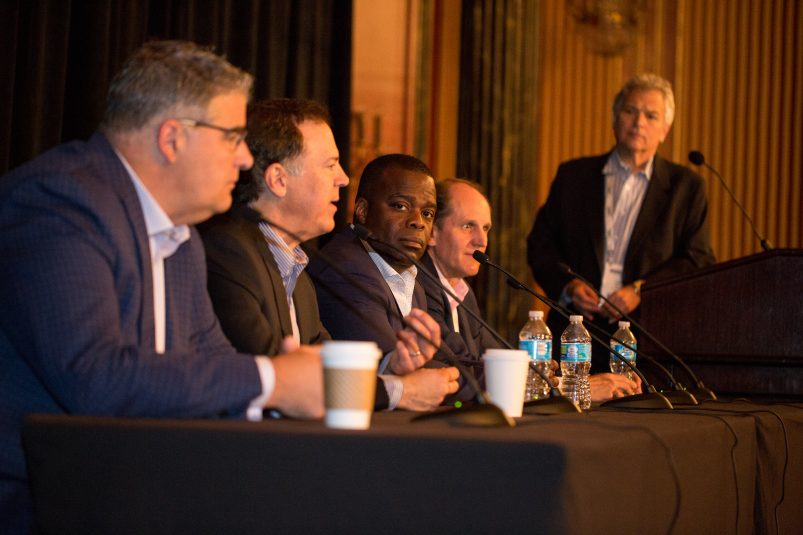RSN Summit: When RSNs Engage With Fans — Wherever They Are — the Business Stays Strong
A changing demographic and multiple modes of consumption pose a challenge
Story Highlights
At last week’s 2017 RSN Summit in Chicago, the executive producers and general managers from MSG Networks, CSN New England, Fox Sports Detroit, and Altitude Sports and Entertainment took the stage to weigh in on the state of the business. And, while they wholeheartedly agreed that the business is healthy, they continually stressed the need for RSNs to actively engage with fans, wherever they may be.

From left: Fox Sports Detroit’s Jeff Byle, MSG Network’s Jeff Filippi, CSN New England’s Princell Hair, Altitude Sports and Entertainment’s Ken Miller, and panel moderator Larry Meyers, executive program director, SVG’s RSN Summit
“How can we engage the viewer, draw in the younger viewers, and expand our audience?” asked Jeff Filippi, SVP, programming and production/executive producer, MSG Networks. “The [RSN] business is fine, but you have to keep moving. Every day, there’s more people turning 55, and there’s more people turning 25, which means that composition of the most important demographic to the advertisers keeps changing.”
Keeping up with the all-important millennial demographic means keeping up with the various platforms on which they consume content, not only on mobile devices but via over-the-top (OTT) offerings as well. As a result, RSNs are facing the threat of cord-cutting (and cord-nevers) head on by investing heavily in their digital presence.
“Our focus is on fan engagement, and trying to figure out and stay ahead of where the fans are going: what device they’re on, when they want to watch,” said Princell Hair, SVP/GM, CSN New England. “I do believe that the RSN business is still a really good business. We have some challenges, but it’s still one of the best businesses out there.”
However, the panelists agreed that it would be a mistake to devote all resources to engaging fans on digital platforms and neglect those consuming the linear broadcast. Baseball fans, in particular, tend to skew older than those of many other sports covered by RSNs and tend to prefer watching a game on living-room televisions rather than mobile devices.
“We need to be everything to everybody,” said Jeff Byle, executive producer, Fox Sports Detroit. “We can’t ignore any segment of our audience, and that’s a balance. That’s a dance. All of us have to battle every day, because we talk about getting younger and we talk about the newest technology, [but] we also have to be cognizant of some of the core fans that may not be completely interested in all of that.”
On the content-creation side, Altitude Sports and Entertainment EVP Ken Miller discussed how he frames this need to “be everything to everyone” to his producers and directors: increasing the number of platforms on which RSNs can engage with sports fans does not dilute the message or the product; rather, it simply increases the exposure for the content.
“When you tell our producers and directors that their content is reaching that many people, they’re energized,” said Miller, who serves as GM/executive producer. “It’s not producing one thing and it goes away. Now it’s reaching all these people. The engagement from our production crews has never been higher.”
Maximizing fan engagement, the panelists emphasized, requires partnering with teams, which is often easier said than done. Byle described the challenges of getting teams to work with their RSNs and getting the access to players necessary to make compelling content when they already have myriad distribution channels at their disposal.
“In some cases,” he explained, “teams want to work a lot closer with the RSNs, and we can help on digital platforms, social media, really making what you do and what they do simpatico. From the access piece of it, not so good. It’s a battle that the RSNs are facing and will continue to face as long as these teams and players have their own platforms. They don’t need us as much as they used to, and that’s something that we’re going to have to battle if we’re going to remain relevant with our audience.”
Despite the challenges of millennial cord-cutting and team access, the overall mood of the panel — and the 2017 RSN Summit in general — was a hopeful one. The RSN business will remain strong as long as there are avid sports fans wanting to follow their hometown teams, and as long as those RSNs continue to engage with their viewers wherever they are.
“Sports is social,” noted Byle. “I say this to our people all the time. We’re not in the television business or the content business; we’re in the emotional-transportation business: we’re transporting people’s emotions when they’re watching an event. Those emotions are most of the time social — with your buddies, with your family. That’s what makes sports special.”
